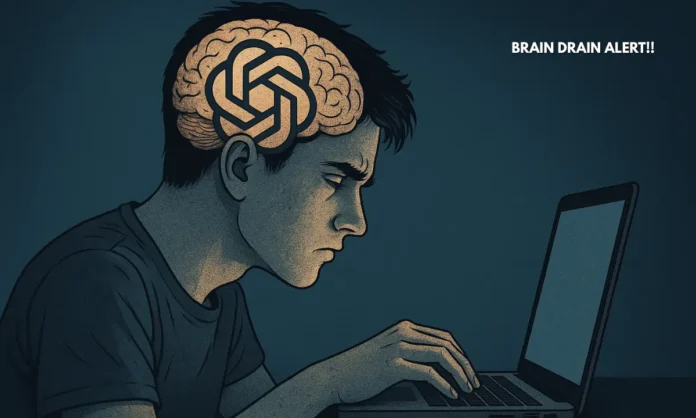Summary
- An MIT study finds that habitual ChatGPT use leads to lower brain activity, poorer memory retention, and weaker critical thinking compared to Google users or unaided individuals.
- Students relying on ChatGPT underperformed in all metrics—neural, linguistic, and cognitive—raising red flags about long-term dependency.
- The study warns that while AI offers convenience, it may be creating a new kind of mental passivity, where users stop evaluating information altogether.
The Cognitive Cost of Convenience: When AI Becomes a Mental Crutch
It answers instantly, writes flawlessly, and never tires. But could ChatGPT also be quietly dulling our minds?
According to a groundbreaking study from MIT’s Media Lab, the answer may be yes. In what is now being called the most detailed neurological analysis of AI usage to date, researchers have found that regular reliance on large language models (LLMs) like ChatGPT may diminish memory, reduce brain activity, and weaken critical thinking skills—especially in students and young professionals.
Titled “The Cognitive Cost of Using LLMs” and published on arXiv, the 206-page report comes as a sobering counterpoint to the AI euphoria sweeping across classrooms, offices, and research labs.
In a digital world increasingly driven by speed and ease, the question is no longer just what AI can do for us—but what it’s doing to us.
BREAKING: MIT just completed the first brain scan study of ChatGPT users & the results are terrifying.
— Alex Vacca (@itsalexvacca) June 18, 2025
Turns out, AI isn't making us more productive. It's making us cognitively bankrupt.
Here's what 4 months of data revealed:
(hint: we've been measuring productivity all wrong) pic.twitter.com/OcHy9197tk
Brain vs Bot: How MIT Measured the Mental Tradeoff
- 54 students were observed for four months using EEG brain monitoring to measure neural engagement.
- Participants were divided into three groups: ChatGPT users, Google users, and a Brain-only group with no digital assistance.
- While ChatGPT users produced faster results, their cognitive performance steadily declined over time.
The study’s design was as rigorous as its conclusions are alarming. Using electroencephalography (EEG) to track real-time brain activity, researchers monitored how each group performed on writing tasks, memory retention exercises, and idea generation.
The group using ChatGPT consistently showed the lowest levels of neural activity, even when attempting unaided tasks later. In contrast, those in the Brain-only group not only performed better but improved over time, with stronger linguistic patterns and deeper insights.
Even Google, often criticized for fostering shallow browsing, proved more cognitively stimulating than ChatGPT.
As one of the lead authors stated: “LLM dependence weakens the writer’s own neural and linguistic fingerprints.”
Mental Passivity and the Illusion of Intelligence
- ChatGPT users reported less mental friction, but also less critical engagement.
- The model’s instant answers discourage questioning, creating a “smooth but shallow” learning experience.
- Users adapted to ChatGPT by accepting its suggestions uncritically, leading to what researchers call “algorithmic trust drift.”
The key finding wasn’t just that ChatGPT users performed worse—it’s why they did.
The study revealed that the convenience of AI-generated text reduced users’ motivation to think critically. With responses polished and immediate, the temptation to accept them at face value became irresistible. This encouraged mental passivity, eroding the user’s impulse to analyze, doubt, or explore alternatives.
“This convenience came at a cognitive cost,” the researchers warned. “Users became less likely to evaluate, and more likely to trust, even when the model was wrong.”
This effect was compounded by algorithmic bias, where top-ranked outputs reflect corporate training data—not verified truth. The result? A polished echo chamber where users confuse fluency with accuracy.
Implications for the AI Generation: A Wake-Up Call in Neural Code
- Long-term ChatGPT users showed diminished engagement even when working without AI, suggesting lasting neurological changes.
- Educators and professionals are urged to rethink AI integration, balancing assistance with intellectual effort.
- The study warns that critical thinking could be AI’s first casualty, if dependency grows unchecked.
Perhaps the most disturbing insight was this: even after abandoning ChatGPT, users did not recover full cognitive engagement. Their brains had adapted to AI’s mental shortcuts—and struggled to reclaim their former thinking patterns.
This challenges the popular view of AI as a neutral tool. According to the MIT researchers, it’s not just what we use AI for, but how AI reshapes the act of using our own minds.
For students, this means rethinking how AI is integrated into learning—not as a substitute for effort, but as a prompt for deeper understanding. For institutions, it means recognizing that digital fluency must not come at the cost of cognitive depth.
Thinking Twice: The Real Intelligence Is Knowing When to Step Back
The MIT study is a timely reminder that intelligence is not just about information—it’s about engagement. Tools like ChatGPT can elevate productivity, but when they replace the cognitive process entirely, they do more harm than help.
In a world obsessed with optimisation, thinking deeply may feel inefficient—but it remains the foundation of innovation, wisdom, and human creativity.
As ChatGPT and other LLMs become increasingly seamless, the question isn’t whether we should use them. The question is: will we still know how to think when they’re gone?


